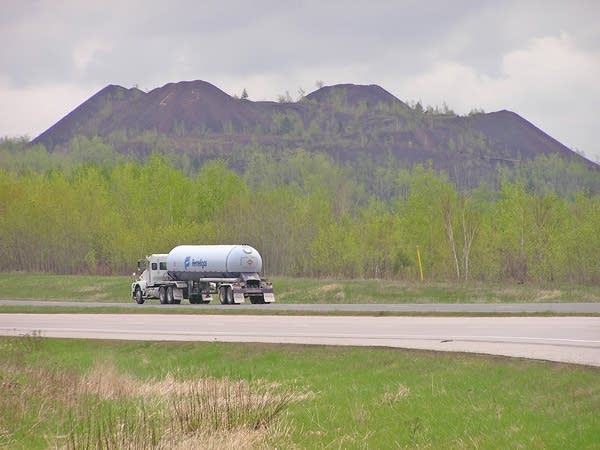New report questions the value of Iron Range mining jobs
Go Deeper.
Create an account or log in to save stories.
Like this?
Thanks for liking this story! We have added it to a list of your favorite stories.

Ever since immigrants began settling the Iron Range, mining jobs have been the gold standard. The pay is good, and the industry supports a slew of spinoff businesses.
Although mining jobs have been shrinking for the last 25 years, people still look at mines as the basis of the entire economy of northeastern Minnesota.
They should look again, says economist Thomas Michael Power. He prepared a report for two environmental groups that are fighting some of the mining projects proposed for the Iron Range. The groups are the Minnesota Center for Environmental Advocacy and the Sierra Club.

Power grew up in Wisconsin, and taught for 30 years at the University of Montana. Recently he's been pushing the idea that mining jobs may cost more than they're worth.
Turn Up Your Support
MPR News helps you turn down the noise and build shared understanding. Turn up your support for this public resource and keep trusted journalism accessible to all.
First, the good news -- the Iron Range is diversifying. According to Power's research, since the decline of mining in 1983, the service sector has become the economic engine of the region. And it doesn't just produce low-wage jobs.
"The health services industry has continued to expand, continued to create more and more relatively high-paid jobs, while the mining industry has gone through incredible fluctuations," says Power. "There's nothing reliable about employment in the mining industry, as the people on the Iron Range know."
According to Power's research, while mining jobs crashed, the region added enough in other sectors to boost the economy by more than the mining jobs were worth.
He says the demand for mining workers will continue to shrink as the industry improves its technology. Power says there's been an important shift in what makes places grow.
"There's nothing reliable about employment in the mining industry, as the people on the Iron Range know."
With telecommuting, the rise of entrepreneurism, and the aging of the baby boomers, more and more people are choosing to live in nice places -- places that haven't been disturbed by industry, like mining.
"That's where I'm concerned -- that in-migration is heavily influenced by how attractive areas are perceived -- not just in terms of employment opportunities but also in terms of social and natural environments," says Power.
So if the Iron Range persists in embracing new and bigger mines, it may be closing the door to other businesses and growth.
Not surprisingly, those involved in the mining industry have little patience with Power's claims.
Frank Ongaro is executive director of MiningMinnesota, a coalition of the newer precious metals mine companies. One of those is PolyMet, which plans to hire 470 workers at a copper-nickel mine near Hoyt Lakes on the eastern end of the Iron Range.
PolyMet is applying for permits to operate for 20 years -- raising the specter of the bust after the boom. But Ongaro says the operation could last much longer than that.
"These companies will keep producing as long as the profitability and demand is there, and demand is growing," says Ongaro. "We need to do it with Minnesota jobs, and with Minnesota's strict environmental standards."
Mining offers special benefits to governments in Minnesota, because of royalties and taxes that pay for everything from recreation centers in Iron Range cities, to education across the state.
"With additional minings, there's additional resources for state and local governments, including school trusts and the permanent university fund," Ongaro says.
Many on the Iron Range would take issue with economist Power's contention that mines scar the land and make it an undesirable place to live.
Marlene Pospeck is mayor of Hoyt Lakes, where PolyMet wants to build a mine. She says people are turning vacation cabins into homes, and retirees are moving in because they like the small-town atmosphere and nearby outdoor recreation.
"Because we are blessed with the outdoor recreation -- fishing, hunting, wilderness, and all that goes with it -- people still consider this a prime not only vacation area, but a good place to live," says Pospeck.
She says mining will always be an important part of the economy in northeastern Minnesota.
Dear reader,
Political debates with family or friends can get heated. But what if there was a way to handle them better?
You can learn how to have civil political conversations with our new e-book!
Download our free e-book, Talking Sense: Have Hard Political Conversations, Better, and learn how to talk without the tension.





